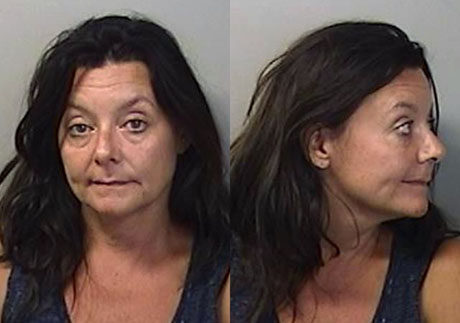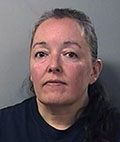Colin R. Wickings is indicted for first-degree sexual abuse, a Class D violent felony. It is alleged in count one that in late June or early July, 2016, in the Town of Bergen, that Wickings subjected a 9-year-old female to sexual contact. In count two, he is accused of the same crime for allegedly subjecting the girl to sexual contact by forcible compulsion. In count three, he is accused of endangering the welfare of a child, a Class A misdemeanor, for acting in a manner likely to be injurious to the physical, mental or moral welfare of a child less than 17. In count four, he is accused of first-degree sexual abuse for allegedly subjecting a 6-year-old male to sexual contact on Sept. 16 in the Town of Stafford. In count five, Wickings is accused of endangering the welfare of a child for acting in a manner likely to be injurious to the 6-year-old male.
Walter B. Hale Jr. is indicted for the crime of driving while intoxicated, as a Class D felony. It is alleged that on May 15 in the City of Batavia that Hale rode a 1984 Kawasaki on various public highways while intoxicated. In count two, he is accused of aggravated driving while intoxicated, as a Class E felony, for allegedly doing so while a child age 15 or less was a passenger. In count three, the defendant is accused of the crime of circumvention of an interlock device, a Class A misdemeanor, for operating a motorcycle not equipped with an ignition interlock device, which he was court-ordered to have. In count four, he is accused of reckless driving, as a misdemeanor. It is alleged in count four that he rode the Kawasaki in a manner that unreasonably interfered with the free and proper use of a public highway -- while intoxicated, traveling at a high rate of speed, failing to yield to an emergency vehicle, failing to stop at a number of stop signs, all while a child age 15 or less was a passenger. In count five, he is accused of endangering the welfare of a child for allegedly knowingly acting in a manner likely to be injurious to the physical, mental or moral welfare of a child less than 17. In count six, Hale is indicted for the crime of aggravated unlicensed operation in the first degree, a Class E felony, for riding the motorcycle when he knew or should have known that his driver's license was suspended, revoke or otherwise withdrawn by authorities. In count seven, Hale is accused of the offense of speeding, for riding on Washington Avenue in the City of Batavia May 15 in excess of the maximum speed of 30 mph. In count eight, the defendant is accused of failing to stop at a stop sign at the intersection of Washington Avenue and State Street. In count nine, he is accused of failing to stop at the stop sign at Washington Avenue and Summit Street. In count 10, he is accused of failing to stop at the stop sign at Summit Street and North Street. In count 11, he is accused of failing to stop at the stop sign at Ross Street and North Street. In count 12, he is accused of failing to stop at the stop sign at North Street and Vine Street. In count 13, Hale is accused of failing to stop at the stop sign at Vine Street and East Avenue. In count 14, he is accused of failure to stop for an emergency vehicle. It is alleged in count 14, that while operating the 1984 Kawasaki on May 15, that Hale failure to yield the right of way to a City of Batavia police vehicle blaring its siren. In Special Information filed by the District Attorney, Hale is accused of having been convicted of the crime of aggravated DWI, as a Class E felony, on Nov. 28, 2012 in Genesee County Court; and DWI, as a Class E felony, on Sept. 18, 2008, and those convictions were within 10 years of the crimes alleged in the current indictment.
Jacob J. Szumigala is indicted for the crime of aggravated vehicular assault, a Class C felony. It is alleged that on April 18 on West Main Street in the Village of Corfu that Szumigala committed reckless driving by operating a 2008 Hyundai Sonata with North Carolina plates in a reckless manner. In so doing, he allegedly caused serious physical injury to another person. It is further alleged that he was intoxicated and had a BAC of .18 or more at the time. In count two, he is accused of first-degree vehicular assault, a Class D felony. It is alleged in count two that Szumigala caused serious physical injury to a person on West Main Street while having a BAC of .18 percent or more at the time. In count three, he is accused of second-degree assault, a Class D felony, for recklessly causing serious physical injury to a person by means of a dangerous instrument -- a motor vehicle. In count four, he is accused of aggravated DWI, per se, as a misdemeanor for allegedly driving the Sonata while having a BAC of .18 percent or more. In count five, he is accused of misdemeanor DWI, for allegedly driving while intoxicated on April 18. In count six, the defendant is accused of first-degree aggravated unlicensed operation of a motor vehicle, a Class E felony. It is alleged in count six that Szumigala drove while his driver's license was suspended, revoked or otherwise withdrawn by authorities, and he did so while under the influence of alcohol. In Special Information filed by the District Attorney, the defendant is accused of having been charged with aggravated driving while intoxicated, per se, as a misdemeanor, in Oakfield Town Court. The suspension referred to in count six was mandatory pending prosecution April 9, 2018, for the violation of Vehicle and Traffic Law in Oakfield and was still in effect when he drove without a license on April 18 in Corfu.
Domingo Gomez-Gomez is indicted for the crime of first-degree rape, a Class B violent felony. It is alleged that in the Town of Alexander on April 28 that Gomez-Gomez engaged in sexual intercourse with another person by forcible compulsion. In count two, he is accused of criminal possession of a forged instrument in the second degree, a Class D felony. It is alleged in count two that on May 4 in the Town of Alexander that he possessed a forged Social Security card with intent to defraud, deceive or injure another.
Jennifer A. Roskey is indicted for the crime of criminal possession of a weapon in the third degree, a Class D felony. It is alleged that on July 14 in the Town of Oakfield that Roskey possessed a dangerus knife or instrument -- a kitchen knife with an eight-inch blade, with intent to use it against another person. In count two, she is accused of second-degree menacing, a Class A misdemeanor, for allegedly intentionally placing a person in reasonable fear of physical injury, serious physical injury or death by displaying a deadly weapon or dangerous instrument. In count three, she is accused of endangering the welfare of a child, a Class A misdemeanor, for knowingly acting in a manner likely to be injurious to the physical, mental or moral welfare of a child less than 17 years old. In count five, Roskey is accused of second-degree reckless endangerment, a Class A misdemeanor. It is alleged in count four that on July 5 while in a private vehicle on the Thruway in Erie County, that she engaged in conduct which created a substantial risk of serious physical injury to another person. In counts five, six and seven, respectively, the defendant is accused of three more counts of endangering the welfare of a child, for acting in a manner likely to be injurious to the physical, mental or moral welfare of three children less than 17 while traveling on the Thruway July 5 from Genesee County to Erie County in a private vehicle. In Special Information filed by the District Attorney, Roskey is accused of having been convicted of aggravated DWI with a child passenger, a Class E felony, on Sept. 23, 2015 in Erie County Supreme Court, and this conviction forms the basis for count one in the current indictment.
Raymond J. Radley is indicted for the crime of first-degree criminal contempt, a Class E felony. It is alleged on in the first week of March in the City of Batavia that Radley violated a duly served Order of Protection by intentionally being in the presence of the protected party. In counts two through 10, he is accused of second-degree criminal contempt, a Class A misdemeanor. It is alleged in counts two through 10, respectively, that he contacted the protected party in violation of the court's Order of Protection, all in the Town of Le Roy: April 16 by telephone; April 16 by phone; May 8 by phone; May 9 by phone; May 14 by phone; May 16 by phone; May 7 via the website Plenty of Fish --- www. pof.com; first week of March, via Facebook Messenger/Video Chat; and last week of March, via Facebook Messenger/Video Chat. In Special Infomation filed by the District Attorney, Radley is accused of having been convicted of criminal contempt in the first degree, a Class E felony, on July 26, 2016, in Livingston County Court, and that conviction was for a violation of a stay away family offense order of protection and it was within five year previous to commission of the crime alleged in the current indictment,
Antonio M. McKinney is indicted for the crime of driving while intoxicated, as a Class E felony. It is alleged that on April 7 in the City of Batavia that McKinney drove a 2002 Mercedes-Benz in the Speedway parking lot at the intersection of routes 5 and 98 while intoxicated. In count two, he is accused of aggravated unlicensed operation in the first degree, also a Class E felony, for driving while his license was suspended, revoked or otherwise withdrawn by authorities. In Special Information filed by the District Attorney, McKinney is accused of having been convicted of DWI, as a misdemeanor, on Oct. 12, 2016 in the Buffalo City Court, Erie County, and the conviction was within 10 years of the crimes alleged in the current indictment.
Melanie M. Matesz is indicted for the crime of criminal possession of a forged instrument in the second degree, a Class D felony. It is alleged in counts one and two that on April 19 in the area of the Batavia City Court offices, located in the Genesee County Courts Facility, that she possessed a forged, fraudulent Order of Protection.
Jonathan E. Seiger is indicted for the crime of second-degree bail jumping, a Class E felony. It is alleged that Seiger was released from custody or allowed to remain at liberty, upon the condition that he would subsequently appear personally in Genesee County Court connection with a felony charge against him and that he failed to appear in court on Oct. 12 or voluntarily within 30 days thereafter.



